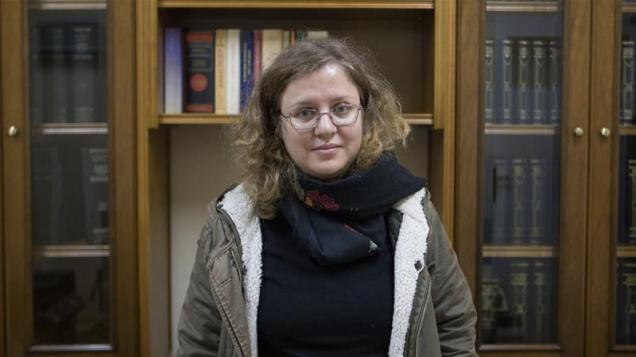

On November 1, Evgenia Kouniaki stepped off an electric bus and headed towards the courthouse when she saw a mob of black-clad Golden Dawn members running in her direction.
Within moments, the men were pounding a fellow passenger with a club. When the Greek lawyer attempted to intervene and yell at the assailants, one punched her in the face several times.
She had been confronted by members of the neo-fascist party twice before, but on this occasion was sent into a state of shock as she was beaten.
Nearby, the party was on trial over allegations of being a criminal organisation.
The group had been passing out flyers to commemorate the deaths of two party members, who were allegedly killed by anti-fascists in 2013.
“I’m sure that I was attacked because I told them to stop … and I’m sure the fascist members of Golden Dawn recognised me from the court,” said Kouniaki, who is part of a legal team for a group of Egyptian fishermen attacked by a Golden Dawn squad in Perama, an area near Athens, in 2012.
Sitting in her office in Exarchia, a central Athens neighbourhood, Kouniaki recalled the attack.
“I saw they were trying to enter the [bus] to find a man … after a while, they started to enter, and I started to yell ‘stop, stop’,” she told Al Jazeera.
Although Kouniaki was puzzled by the attack – she did not hear the man provoke the far-rightists and he did not subsequently speak out in the media – she has since concluded that they “wanted to send a message”.
After the incident ended, the men walked off, passing the police without being stopped.
Kouniaki recognised her attackers as members of Golden Dawn’s Piraeus branch; she has since filed a complaint.
By the time of publication, the Greek police had not replied to Al Jazeera’s request for a comment.
In a statement published the following day, Golden Dawn leader Nikolaos Michaloliakos said he “strongly condemn[s] every act of violence” without referencing the attack on Kouniaki.
It was the latest in a string of similar attacks in Greece, which have sparked fears of a resurgence in far-right violence.
Golden Dawn currently has 16 seats in the Hellenic Parliament and three in the European Parliament. While it is not the only far-right group, it has a reputation for carrying out vigilante attacks.
‘GO BACK TO YOUR VILLAGE’
On November 26, a group of Greek football fans attacked Pakistani immigrants as they celebrated the birth of Prophet Muhammad in central Athens’ Omonia Square. Police fired tear gas and sound grenades to disperse the crowd.
 |
| Golden Dawn has 16 seats in Greece’s parliament [Aggelos Barai/SOOC/Al Jazeera] |
Earlier this month, a far-right group targeted the house of Amir, an 11-year-old Afghan boy who had been blocked from carrying a Greek flag during a school parade in October.
A neo-Nazi vigilante organisation calling itself Crypteia, a reference to a group of ancient Spartans infamous for attacking slaves, claimed responsibility for the attack on the boy’s home.
Crypteia is believed to be a splinter group that broke away from the Golden Dawn, which has toned down its street-level violence in recent years owing to the ongoing trial of 69 of its members accused of operating a criminal organisation.
Last month, a group of men surrounded and attacked a pair of Pakistani migrant labourers in a field in Aspropyrgos, an industrial area near the Greek capital of Athens.
Vakas Hussein and Ashfak Mahmoud, the victims of that attack, were subsequently hospitalised for stab wounds and injuries sustained from blows with iron rods to their heads and bodies.
Speaking to Greek media, Mahmoud later recalled his attackers shouting racist taunts and threatening to set them ablaze. Speaking to Greece’s 24/7 News at the time, he said: “They said they would burn me alive.”
‘FILL THE VOID’
In March, a gang of Golden Dawn members brutally beat Alexis Lazaras, a 24-year-old university student, near the party headquarters in an Athens suburb.
 |
| Members of the neo-Nazi Golden Dawn party have campaigned against Muslim refugees in Greece [Aggelos Barai/SOOC/Al Jazeera] |
The attack is suspected to be retribution for an anti-fascist action that saw masked anarchists smash the windows of the party’s main headquarters earlier that day, though there has been no indication that Lazaras had any connection to that incident.
On November 8, a criminal court in Athens delivered a guilty verdict to Golden Dawn member Christos Zervos for causing serious bodily injury over the attack on Lazaras. His sentence was suspended pending appeal.
Far-right attacks on refugees and migrants on Greek islands, such as Chios and Samos, have also become part and parcel of life for asylum seekers since the mass influx of refugees to Europe started in 2015.
Seraphim Seferiades, a politics professor at the Panteion University in Athens, explained that the recent uptick should raise red flags.
He argued that the government, currently led by the leftist Syriza party, has failed to provide an alternative to growing xenophobia and disillusionment with the status quo.
“As long as there is no alternative from the left, I wouldn’t be surprised if the Golden Dawn sought to fill the void. We’ve been seeing it all over Europe,” he said.
Syriza came to power in January 2015 after campaigning on a left-wing programme, but it has drawn criticism for reneging on promises to end austerity and to support refugees and migrants uprooted by war and economic devastation.
Seferiades said Syriza’s about-face “has created a gap, and any demagogue who comes along and is backed up by considerable resources could fill that role”.
‘NOT CAPABLE OF REFORM’
Thanasis Kampagiannis, a lawyer in the Golden Dawn trial, has monitored the far-right organisation and others like it for years. “Golden Dawn is a neo-Nazi organisation, and it models itself off Hitler’s battalions,” he told Al Jazeera.
In October 2012, the United Nations refugee agency said that 87 racist attacks had been recorded between January and September of that year. Often wearing Golden Dawn insignia, the attackers targeted refugees and undocumented migrants from Afghanistan, Bangladesh, Pakistan and elsewhere.
Yet, the party was put on trial after one of its members killed anti-fascist rapper Pavlos Fyssas in September 2013. Since then, the number of racist and far-right attacks in Greece has sharply decreased.
“The number of attacks decreasing is beyond doubt… and this shows that the racist attacks we experienced in 2012 and 2013 were organised by Golden Dawn,” he argued.
“But this doesn’t mean we don’t still have fascist attacks, and this mainly has to do with the fact that Golden Dawn is not capable of reform. It cannot stop [carrying out attacks], even if it needs to decrease its violence.”
Back in her office, Kouniaki said she expected violence from Golden Dawn but was nonetheless stunned by the attack.
“I was shocked because the reality is that I didn’t believe it could happen outside of the court where they are on trial,” she said.
She was first threatened by Golden Dawn supporters in 2010 in Agios Panteleimonas, an area in Athens. After she arrived in the neighbourhood to find a group of Afghan refugees sitting bloodied on the road after being attacked, a throng of party supporters hurled threats in her direction.
Two years later, while making her way home after a political rally, she encountered a group of men she suspects were Golden Dawn members beating a Bangladeshi immigrant at a metro station. When she tried to intervene, they dragged her off and threw her to the pavement.
For her part, Kouniaki said she will not be deterred by violence or threats.
“This is what Golden Dawn wants in society: People to fear expressing their ideas and to not stand with immigrants and refugees … But it is a political duty.”

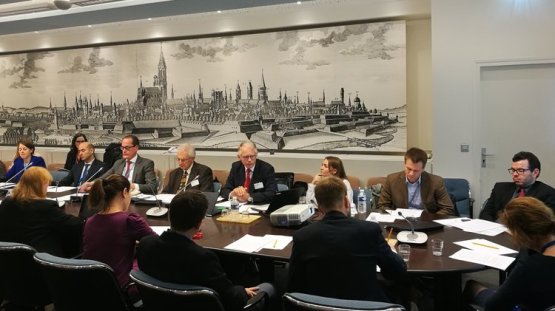
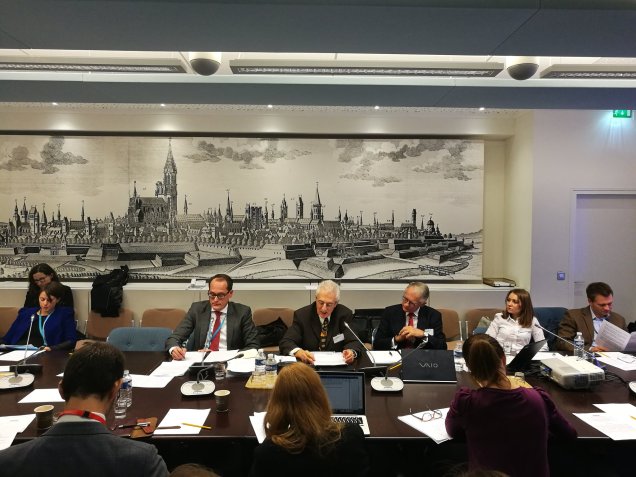 Greek Helsinki Monitor‘s Panayote Dimitras (in the middle) making the presentation, with Kevin Steeves on his right and Piers Gardner and Vitalia Lebid on his left
Greek Helsinki Monitor‘s Panayote Dimitras (in the middle) making the presentation, with Kevin Steeves on his right and Piers Gardner and Vitalia Lebid on his left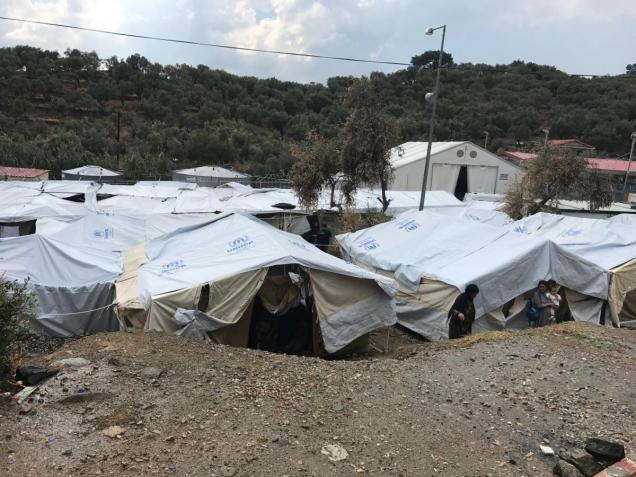 Refugee tents next to the Moria hotspot on Lesbos island, where thousands of people, including very young children, pregnant women, and people with disabilities, are trapped in abysmal conditions as winter sets in. © September 2017 Emina Cerimovic.
Refugee tents next to the Moria hotspot on Lesbos island, where thousands of people, including very young children, pregnant women, and people with disabilities, are trapped in abysmal conditions as winter sets in. © September 2017 Emina Cerimovic.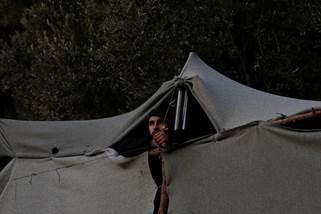
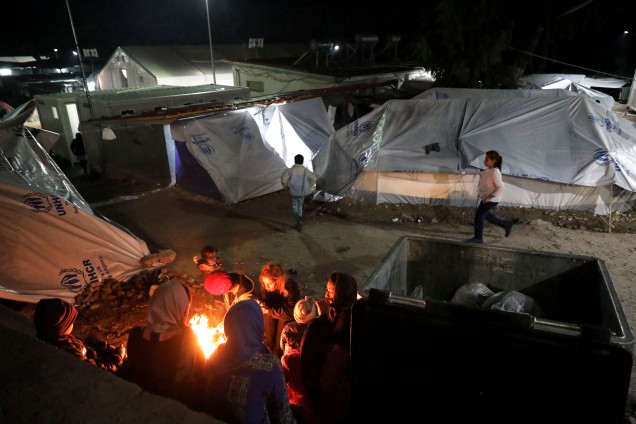 Migrants and asylum seekers gathering around a fire, inside the Moria hotspot on Lesbos island, Greece. Thousands are living under terrible conditions, in overcrowded tents and containers, as the weather worsens. © November 2017 Giorgos Moutafis
Migrants and asylum seekers gathering around a fire, inside the Moria hotspot on Lesbos island, Greece. Thousands are living under terrible conditions, in overcrowded tents and containers, as the weather worsens. © November 2017 Giorgos Moutafis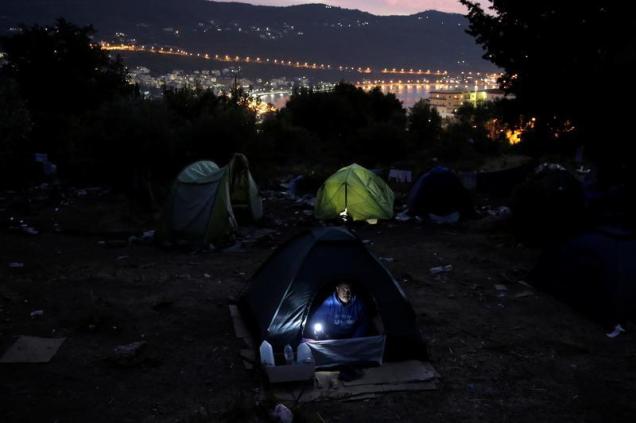 An asylum seeker is seen inside his tent at a makeshift camp on the Greek island of Samos, Greece. © October 2017 REUTERS/Costas Baltas
An asylum seeker is seen inside his tent at a makeshift camp on the Greek island of Samos, Greece. © October 2017 REUTERS/Costas Baltas